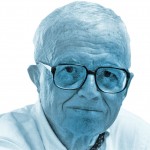
As a boy I never kept watch for the first robin. My eye was out for the first newspaper articles from the small Florida towns where the major league baseball teams went for spring training. Bradenton! Lakeland! Clearwater! Vero Beach! “Come on down!” those places called to me, and I vowed that some day I would.
That day came in March 1982 when I was driving through central Florida and saw a sign to Winter Haven, the spring training camp of the Boston Red Sox. My rented car, like a good horse, knew the way, and soon I was settled in the grandstand with a hot dog and a beer. The sun was warm, the grass was green, and the air was alive with the sounds of rebirth: bat meeting ball, ball meeting glove, players and coaches chattering across the diamond. Winter Haven indeed! Winter Heaven was more like it.
I was sitting in a sea of codgers, codging the time away. A rookie left-hander was on the mound, warming up for an intra-squad game. I was enjoying his form, wondering if this was his year to make it to the majors. I told the man next to me that the kid reminded me of Warren Spahn. The man said he looked like Preacher Roe. His wife said he was a ringer for Harvey Haddix. An old codger mentioned Lefty Grove. A young codger mentioned Vida Blue. We were typical springtime fools, seeing what we wanted to see.
Many years later, recalling that moment in my book Spring Training, I wrote:
So the afternoon slipped by in contentment. The ancient rhythms of baseball were intact; we could have been watching a game in 1882, not 1982. No organist toyed with our emotions, no electronic scoreboard told us when to cheer. We were suspended in a pocket of time unlike any other moment in baseball’s long year. It was a time of renewal for the players and also for the fans. It was a time for looking both forward and back: forward to the new season and as far back as the oldest codger could recall. And what made it all work was memory. Memory was the glue that held baseball together as the continuing American epic.
A few years ago I used that passage in my memoir-writing class to suggest how to write about a place. Mere facts, I said, aren’t sufficient (“our house was on Spruce Street,” “the neighbors had a dog named Spot”). The task is to find the point of the place—its identifying idea. It may be waiting for you to find it. Or you may have to impose on the place some larger idea of your own. In the case of my afternoon in Winter Haven, the point of the place is memory. That’s what the passage is “about.”
One student, Thomas Ryan, was a firefighter who had been on duty in the World Trade Center on 9/11. “I don’t think the piece is about memory,” he said. “I think it’s about loss.”
That hit me like a boxer’s punch. I was so sure my piece was about memory, so pleased with my tidy organizing idea. But then I thought: Tom Ryan is the expert here, not me. A firefighter who was in one of those collapsing towers knows everything there is to know about loss. Thanks to Tom, I saw that memory is only a writer’s recall mechanism. I was in the loss business; my territory was the unrecoverable past.
I thought of all the stories that have been told in my class for 20 years. Some of the tellers are old Jewish men and women who survived the Nazi camps and are still haunted by the death and dispersal of their families. Some are men and women trying to recapture the lost landscape of their childhood—the much-loved small-town Main Street that’s now mostly strip malls. Some are middle-aged women whose life is still stalled on the day their father died when they were children.
I thought back to some of my favorite memoirs. Vladimir Nabokov’s Speak, Memory, which fastidiously recalls a golden boyhood of summer houses and private tutors in czarist St. Petersburg, takes its emotional undertow from our knowledge that that world was about to end forever. Jill Ker Conway’s The Road From Coorain recalls her isolated childhood in the outback of Australia and the seven-year drought that ended her parents’ homesteading dream and ended up killing her father. Another lost father! As an adult, Conway would emigrate to America, where she became president of Smith College and wrote several books about academic life. But her enduring book is the one about a family enterprise gone disastrously wrong in a faraway land.
Baseball would seem be a safe writers’ subject. As the sportswriter Red Smith often reminded us, it’s just a game that little boys play. Yet the classics of baseball literature–Ring Lardner’s You Know Me Al, Mark Harris’s Bang the Drum Slowly, Roger Kahn’s The Boys of Summer–are tinged with sadness. The reality of baseball is no different from anyone else’s reality. Even the boys of summer grow old.

